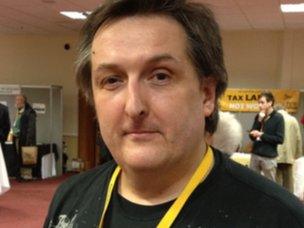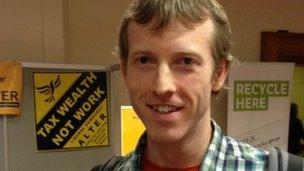Lib Dems: Mixed mood at spring conference
- Published
The Liberal Democrats say they are a serious party of power but media coverage of Chris Huhne and Lord Rennard has dogged the leadership. So how do members feel?

Simon Oliver rues the loss of Chris Huhne as a negotiator in government
It is hard for Lib Dems to know what to think.
They managed to hold onto Eastleigh in the recent by-election, despite the former MP, Chris Huhne, facing a possible jail sentence on Monday for perverting the course of justice.
Opinion poll ratings remain low and the party's former chief executive, Lord Rennard, has been accused of inappropriate behaviour towards female activists.
With just over two years to go until the next general election, the spring conference in Brighton sees members in a mixed mood.
Simon Oliver, chairman of Redditch and Inkberrow Lib Dems, is one of the more upbeat
"I think we're a lot stronger than anyone gives us credit for," he says. "There's a lot of negative press, particularly on the Labour side, while the Tory press have never been kind to us.
"But people realise what great people we have working for them, councillors and MPs, who are working hard... People realise that having a Lib Dem MP is different to the other parties just sharing seats."
'Serious issue'
Mr Oliver dismisses the Huhne issue as "personal problems", although he notes that his loss is a substantial one: "It's sad for the party because he was a very effective negotiator on environmental and other issues."
He feels next year's European elections will be the "critical test" before the 2015 general election for Nick Clegg and his colleagues.

Anita Mann (l) says confidence is down, but Elizabeth Isaac-Garner is optimistic
Among those milling around next to the main conference auditorium at Brighton's Metropole Hotel, the allegations surrounding Lord Rennard - which he denies - are causing more concern than Huhne's fate.
"It's a serious issue, but nothing's been proven about him," notes Mr Oliver.
"There's been a bit of a loss of confidence over [the allegations]," Anita Mann, treasurer of the Lib Dem association in Rochester, Kent, says.
"It's about strength of character and people with more conviction. Nick Clegg is a bit soft."
Jonathan Brown, from Chichester, West Sussex, joined the party when it was doing well during the "Cleggmania" period ahead of the 2010 election.
"The Rennard issue bothers me much more than the Huhne stuff," he says. "The Huhne stuff was about an individual. The Rennard allegations are suggesting a wider problem. I've spoken to a lot of female colleagues and friends and I've never heard from them about this sort of problem.
"The key thing for Lib Dems is we are seen as a party of fairness and equality."
'Cockroach'
Morale is "surprisingly good", Mr Brown argues, with the party's popularity having reached its nadir. The only way is up, in other words.
"The party's obviously suffered in the polls and we've lost a lot of members," he says. "That's clearly already happened."

Jonathan Brown believes the party's tax policies will prove popular
Lib Dem president Tim Farron has likened the party to a "cockroach" for its remarkable survival skills
Other figures have avoided such language but echoed the sentiments.
Elizabeth Isaac-Garner, from the Canterbury and Coastal association in Kent, agrees, saying: "I think we look better than Labour or the Conservatives. The Tories have tried their hardest, but we have done the best work in coalition."
The message that Mr Clegg has tried to get across at the conference is one of transformation. The Lib Dems have become a party of government, he opines, but is the message getting through and is it a vote-winner?
Even the leader says it is not enough "to say it over and over again".
Yet Mr Brown thinks one Lib Dem policy in particular could boost the chance of success.
"In Eastleigh, raising the income tax threshold got through. That stuff resonates," he says. "We've had to negotiate within the coalition, showing we are a party, not a pressure group."
The Lib Dems have leaked members since the last election, but Jon Stevens is the sort of figure who might provide hope. He joined the party in October last year.
"I would've said I was a Tory through and through," he says, "but I had a real look at what my views were. I found they were most like those of the Lib Dems. That surprised me.
"My view is that not enough people know about our policies. We have to let them know that we are a party that doesn't believe in taxing work as much as others.
"We've done the right thing for the country."
Whether enough people agree is the question which will only be definitively answered in 2015.
- Published10 March 2013
- Published9 March 2013
- Published9 March 2013
- Published8 March 2013
- Published7 March 2013